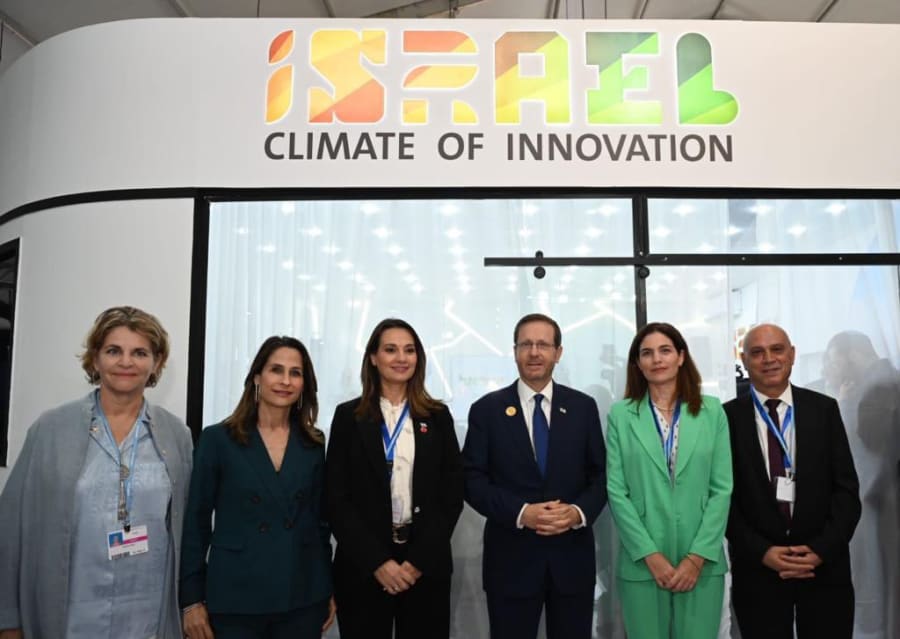Israeli environment minister urges Middle Eastern cooperation on climate crisis
Zandberg believes that Israel’s level of preparedness to tackle environmental challenges has improved under the outgoing government

Israel’s outgoing Minister for Environmental Protection Tamar Zandberg urged the incoming Israeli government and the Arab world to embrace regional cooperation in battling the climate crisis, just days after the Israeli president said the Middle East is on the brink of a climate catastrophe.
Zandberg made international headlines at the United Nations’ COP27 Climate Change Conference in Sharm el-Sheikh, Egypt, simply for sitting next to high-ranking Lebanese and Iraqi officials, whose countries do not recognize the Jewish nation’s existence and are still officially at war with Israel.
“I sat with the Lebanese and Iraqi representatives in the framework of a large round table on the Cypriot initiative. There were no personal meetings between us. Still, it was a significant and important encounter. The climate crisis is a threat shared by all of us. It goes beyond rivalries, borders or political differences,” Zandberg told the Al Monitor news outlet.
“The countries of the region share the warming and drying climate, and just as they share the problems, they can and should share the solutions,” Zandberg said on Tuesday. “No country will be able to withstand the climate crisis alone, and a joint effort by the countries of the region to share preparation and adaptation solutions is the most important thing for the coming years.”
Zandberg stressed that cooperation between Israel and the Arab world is already taking place on numerous projects.
“We have been working with the Jordanians on cleaning up and rehabilitating the Jordan River. We are much involved in the Cypriot regional initiative. Yesterday, [Israel’s] Regional Cooperation Minister Esawi Frej signed the solar energy-water desalination Memorandum of Understanding with Jordan and the Emirates,” she said.
“We are also working with the Egyptians. This COP [conference] at Sharm el-Sheikh is the first time Israel has set up a national pavilion in a climate summit, and it is attracting much attention,” the minister said. “We have visitors from neighboring countries, from the Gulf and elsewhere.”
According to Zandberg, members of the Israeli delegations have been meeting with their regional counterparts.
“It’s a very productive conference for us, especially since it takes place just next door to Israel, in Egypt,” she said.
Not everyone in the Middle East embraces Arab-Israeli cooperation; Tunisian Prime Minister Najla Bouden faced criticism for exchanging words with Israeli President Isaac Herzog at the conference. Tunisia and Israel do not have diplomatic relations, despite the North African country being considered one of the most liberal states in the Arab world.
Zandberg will not serve in the 25th Knesset. Before the recent election she announced she's taking a break from politics. In any case, her political party Meretz failed to pass the minimum electoral threshold of 3.25%.
She believes that Israel’s level of preparedness to tackle environmental challenges has improved over the past year under the Lapid-Bennett government.
“Israel arrived to COP27 much more prepared than for COP26. Over the last year, we have adopted a series of decisions and allocated considerable funding for fighting climate change. It has definitively been a priority for the government,” she said.
Zandberg expressed hope that the new Israeli government would be committed to the vision of pursuing zero net emissions by 2050.
“We started late in the game and had considerable catching up to do. We are a small and crowded country, so it’s not easy. Still, I believe that, with more legislation, more funding and more measures, we could pass this goal and be even more ambitious than 27%,” Zandberg said, in reference to the net-emissions reduction target for 2030.
The Israeli pavilion at COP27 arranged an event which highlighted other cutting-edge technologies that could meet climate goals, including space-based technologies.
“Dealing with the climate crisis requires us to strengthen our data gathering and analysis capabilities. Space technologies provide us with opportunities to improve the observation of changes such as in temperatures, heat islands, sea level, fires, floods, etc.,” said Gideon Bachar, special envoy for climate change and sustainability with the Israel Ministry of Foreign Affairs. “Israel needs advanced capabilities to enhance our understanding of threat scenarios and preparations for them.”
According to Bachar, the Israel Ministry of Environmental Protection is working to build a national risk map that would be able to collect information in all tiers from space, the air, water and land.
The information would feed into “sensitive maps that will allow us to understand where it is necessary to act with the greatest urgency,” he said.

The All Israel News Staff is a team of journalists in Israel.













